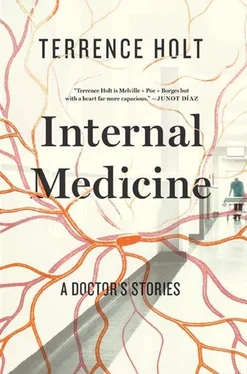The voice at the other end of the line was professionally calm, faultlessly polite. After a brief discussion of our symptoms and the meal that had preceded them, the woman said to me, “It certainly does sound like the mushrooms. Unfortunately, if that’s the case, there’s very little that can be done: from the symptoms you describe, I’m afraid it’s too late to do anything.” A brief silence on the line, and then she spoke again. “But before you go to the hospital, you must call your host. He’ll need to contact anyone else who had the soup.”
I hung up the phone. I understand now that what the voice on the other end of the line had meant by “too late” was simply “it will have to run its course.” That the course could end in our deaths was another part of what she hadn’t said, but there are many kinds of mushrooms, and not all of them are deadly. At the time, I didn’t know that.
I let my hand lie on the receiver while a minute passed. My hand looked as if it were something somebody had left there. It was three in the morning on a sullen July night. Out the kitchen window I could see the full moon floating in a brown sky. In a moment I would move again. In a moment I would go back down the hall and tell my wife what I had heard. In a moment.
I stood there for what seemed a long time, hearing nothing of the night noises, only a dull roaring in my ears, while I put off the moment when I would move and time would begin again.
I pulled my hand from the telephone and walked back through the darkened house, stopping at the door of what was going to be the baby’s room. It still smelled of fresh paint. I stood there a moment and thought, So this is how it feels.
That was all I could come up with: This is how it feels to be dead. I stood at the door of the empty room for a long time, feeling nothing.
We were not, of course, dead. Hans had been joking about his mother gathering mushrooms. He had bought them at the Pathmark that afternoon. He was somewhat testy about this, a little too annoyed with the three a.m. phone call to be properly remorseful (I felt) about the spoiled fish he had served us after the soup. My wife and I endured nothing worse than three days of nausea, a week of depressed appetite, and an aversion to mushrooms that lingers to this day.
Nothing worse than that.
AS FOR ARIEL CRAWLEY, after she told me the time of her overdose, she begged me not to tell her mother. Why not? I wanted to ask, but I restrained myself. It was of a piece with whatever hurt she had been trying to treat with Tylenol. And it no longer mattered. I told her that her medical condition was nobody’s business but her own, and that the hospital would respect her privacy. It was up to her to tell her mother as much or as little as she chose. Then I left the room.
I left under some sense of urgency, feeling there were things I should do. But other than placing a few phone calls, there wasn’t anything, really. The ED had already ordered the antidote, and it was clear that it wasn’t working. I let Virginia know what I had learned, and called the ICU to let them know they could be getting a transfer before the night was over. Then I remembered Sara Barnes, and called her as well. She was puzzled by the information, liver failure and Tylenol toxicity not fitting into her protocols any more than appendicitis fit into mine, but she concluded that it didn’t change anything. The patient’s appendix was still a surgical emergency; her attending was on his way in; Ariel Crawley was posted for the OR that evening. As for her liver, after a word or two about involving Hepatology post-op the conversation slid off into silence.
IT DIDN’T END THERE. Ariel Crawley fell off my radar later that evening as she was wheeled off to surgery. Her mother, looking no more concerned than any woman would following her daughter to an emergency appendectomy, followed down the hallway with an armful of Ariel’s belongings. I went home the next afternoon, hearing nothing more until several days later, when I learned that she had had her appendix successfully removed before midnight Saturday. And that two days later she had undergone a successful liver transplant. Her youth, her fundamental health, the abruptness of her failure, had all catapulted her to the head of the list, and through another stroke of luck a suitable donor came in, the helmetless passenger of a wrecked motorcycle, and now she was in the surgical ICU, holding her own.
Over the next several months I continued to hear of Ariel’s progress. There were the usual post-transplant problems, but the last I heard she was doing as well as can be expected. Life with someone else’s liver is never easy: episodes of rejection, toxicities of immune-suppressing drugs, the threat of infection. But I lost eight patients that month, and Ariel wasn’t one of them. She got a second chance. A victory of sorts.
I know I’m not really entitled to claim any kind of victory here: my contribution, in the end, was to order a CT that bought her an irrelevant surgery, and to force a confession, too late, to something that was obvious anyway. But I’ll claim my victories where I can, earned or not.
Did Ariel deserve hers? The question lingers, but I have no answers. Ariel’s out there somewhere, I hope, living her life somehow, while others sicken and die waiting for transplants that never come. Maybe no one earns a second chance. Who would be worthy of it? But we did have a baby, and even (God blessed us) another. I started writing again. Residency passed like a bad dream, and on awaking I found I cared again. Perhaps too much.
All victories are worth claiming, when we consider the alternatives. And when we recognize that all such victories are temporary, forestalling that dead moment in the middle of the night.
A FAINT CLICK OPENS THE AIR. A disembodied voice calls out, “Adult Code 100, Adult Code 100, 5 East. Adult Code 100, 5 East.” Or it might be “Code Blue, Code Blue 3C, Code Blue 3C.” From place to place the wording varies, but the message thinly hidden in the code is always the same: somewhere in the hospital, someone is dying.
The nature of the emergency varies as well. Hearts stop. Vital signs droop. We give up the ghost. But whatever the nature of the emergency, the response is the same: from all over the hospital the code team comes running, and the attempt at resuscitation begins.
The team is an invention of the 1960s, when evidence began to suggest that people suffering cardiopulmonary arrest had a much better chance of surviving if organized help reached them within two minutes. The “code” part was a response to public relations concerns that the laity might be upset by announcements of “Cardiac arrest on 4 North.” Hence the “Code”—100, blue, pick your meaningless term. Thanks to television, I doubt anyone is taken in by it these days. But it adds another element of insider status to a culture that values that sort of thing.
Despite being no secret to anyone, the code still holds its mysteries. I’m not sure, still, just what I have learned by running to so many codes. But the experience haunts me, long after the fact. As if, somewhere in the tangle of tubes and wires, knotted sheets, Betadine, and blood, I lost track of something important. Listen.
IN THE HOSPITAL WHERE I work, codes go something like this. A nurse finds a patient slumped over in bed. The nurse calls her name. No answer. The nurse shakes her. No answer. Harder. Still no answer. The nurse steps to the door and calls, in tones that rise at each syllable, “I need some help here.” The rest of the nurses on the floor converge. Within a minute, every bystander within hearing is gathered at the door.
In the basement of the hospital, a hospital operator listens intently to her headset. She flips a switch, and a faint click opens the hospital to the microphone on her console. “Adult Code 100, 6 South. Adult Code 100, 6 South.” The message goes out on the hospital PA system, her bodiless voice filling the hallways. It also goes out to a system of antique voice pagers, from which the operator’s measured words emerge as inarticulate squealing. The pagers are largely backup, in case some member of the team is, say, in the bathroom, or otherwise out of reach of the PA system.
Читать дальше












